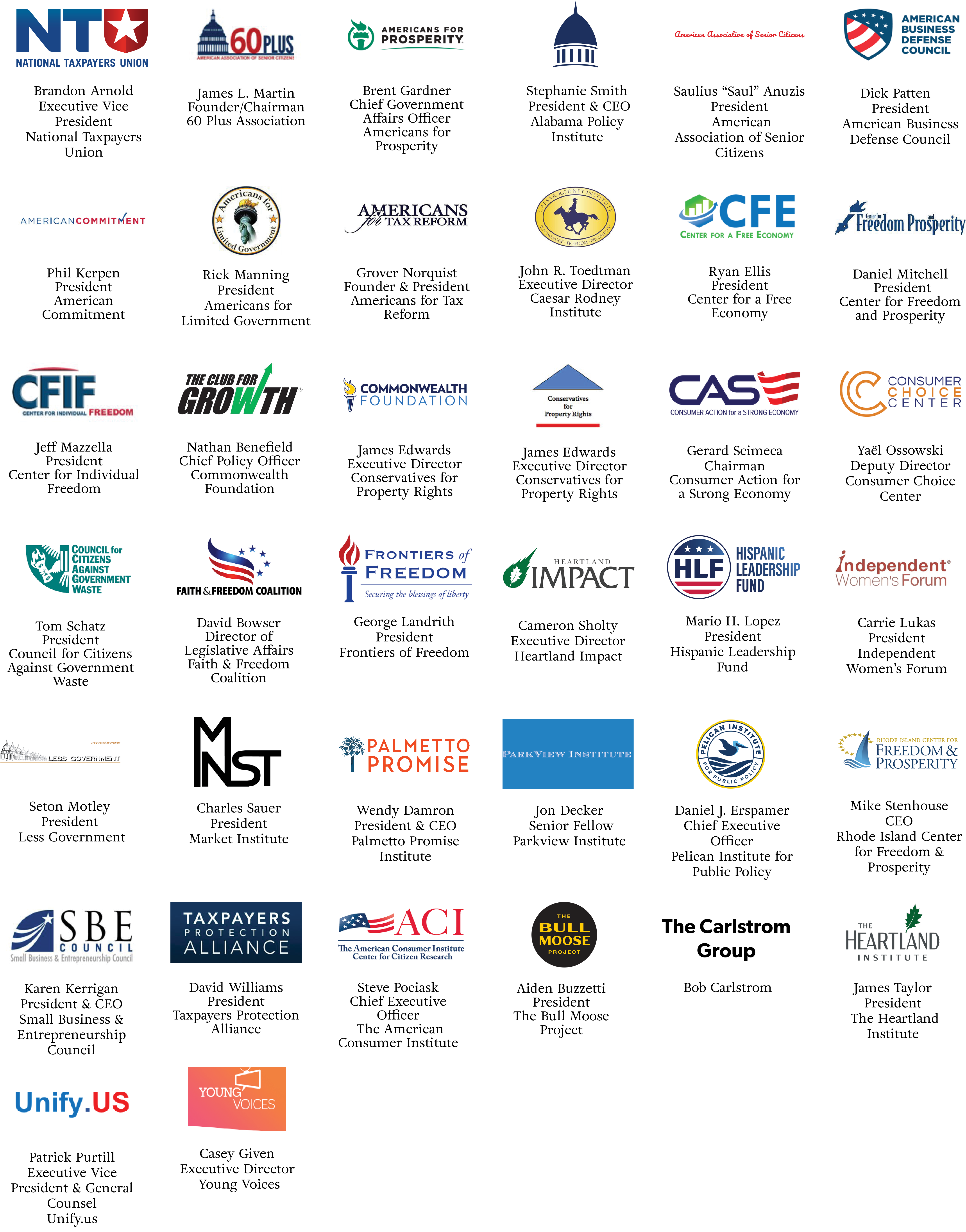| The Honorable Jason Smith, Chairman The Honorable Richard Neal, Ranking Member Committee on Ways and Means US House of Representatives 1129 Longworth House Office Building Washington, DC 20515 | The Honorable Mike Crapo, Chairman The Honorable Ron Wyden, Ranking Member Committee on Finance United States Senate 219 Dirksen Senate Office Building Washington, DC 20510 |
Dear Chairman Smith, Ranking Member Neal, Chairman Crapo, Ranking Member Wyden, and Members of the Committee on Ways and Means and the Committee on Finance,
On behalf of the undersigned organizations, which advocate for millions of taxpayers, workers, and consumers across America, we urge you to oppose any efforts to raise the corporate tax rate above the 21% level set in the 2017 Tax Cuts and Jobs Act (TCJA), more commonly known as the Trump tax cuts.
While some critics try to paint the 2017 corporate tax rate reduction as a giveaway to big business, there were bipartisan concerns going back well over a decade that U.S. corporate rates were too high relative to the rest of the world. Studies showed that these high rates were affecting our nation’s economic competitiveness and holding back wages and the availability of jobs for American workers. Even many leading Democratic economists were supportive of lowering the corporate tax rate.
The TCJA brought down the combined corporate tax rate to a level just above the OECD average, and since then much of the developed world has continued to lower its rates. Corporate executives have indicated that the lower rate was an important part of their decisions to increase investment in the U.S. According to a study of corporate tax returns covering years before and after enactment of the TCJA, the U.S. domestic corporate capital stock will grow by over 3.5% over the long run based on the lowered corporate rates alone. Moreover, by the end of the 10-year budget window, dynamic effects of the rate changes will fully offset static revenue losses from the changes. This suggests that further rate cuts could lead to even greater economic benefits.
Americans widely benefited from the lowered corporate tax rate, which increased wages, jobs, and the balances of retirement plans for millions. Increasing the corporate rate from the current level could therefore cost jobs, lower wages, and hurt future retirement prospects. A past study has shown that half of the burden of a corporate rate increase would be borne by workers, primarily those who are low-income, younger, and female. Another showed that wages drop by 49 cents for each dollar increase in corporate taxes. Studies have also shown that a rise in corporate rate led to a reduction in GDP growth, lower potential output, sagging productivity, and higher inflation in the long run. High rates can even lead to an increase in the size of the informal economy, thereby exacerbating tax avoidance. And since any increase would push America’s corporate tax rate above peer Organization for Economic Cooperation and Development (OECD) countries, it would make investing in the U.S. less attractive for international firms, costing American jobs.
We call for members of Congress to oppose any legislative proposals that would increase corporate tax rates. Tax stability is critical to corporate investment and decision-making, which is one reason why the new rates were made permanent in the TCJA. Higher, volatile rates can reduce the ability for businesses to make clear investment decisions, possibly leading to less capital formation, fewer jobs, and lower wages. Indeed, a recent study of OECD countries points to a stabilization in corporate tax rates worldwide. The lower corporate tax rate in the TCJA is working and Congress should not increase it.
Thank you for your consideration, and we stand ready to assist with the passage of critical tax legislation this year.
Sincerely,


